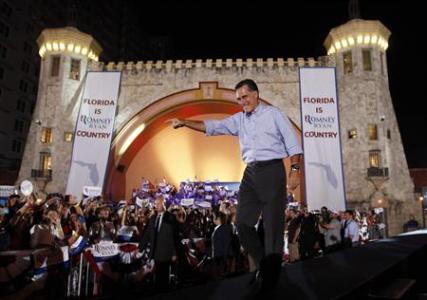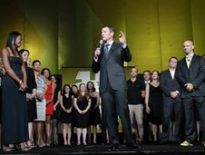(Reuters) – The election between President Barack Obama and Republican challenger Mitt Romney looks like it will be a knuckle-biter – unless you go by one of the United States’ most respected public-opinion polls.

As most surveys show Obama and Romney locked in a virtual dead heat, Gallup finds that the Republican would win by a comfortable six percentage points if the election were held today.
Questions about the gap between Gallup’s findings and those of other pollsters is the latest fuss this election season over polling methodology as partisan passions come to a boil in the heated final weeks before the November 6 presidential contest.
With a record of correctly predicting all but three of the 19 presidential races stretching back to 1936, Gallup is one of the most prestigious names in the business and its outlier status has other polling experts scratching their heads.
“They’re just so out of kilter at the moment,” said Simon Jackman, a Stanford University political science professor and author of a book on polling. “Either they’re doing something really wacky or the other 18 pollsters out there are colluding, or something.”
Gallup’s editor in chief, Frank Newport, said he didn’t know why his results didn’t line up with others. Nor did he seem unnerved by the disparity.
“We try to keep our eyes on the boat and do the best job possible,” he said. “We’re going over some additional tweaks with our methodologists to make sure we’re on top of it.”
When Obama opened up a wide lead in polls last month, Republicans accused researchers of interviewing too many Democrats. Those complaints evaporated when Romney surged ahead after his strong October 3 debate performance.
Now, the Obama campaign is questioning the validity of Gallup’s methods after it released a poll earlier this week that showed Romney leading among likely voters in the handful of battleground states that will decide the election.
Obama pollster Joel Benenson called the Gallup survey an “extreme outlier” and said its formula to determine likely voters created a bias against Obama supporters. “Gallup’s data is once again far out of line with other public pollsters,” he wrote in a memo on Monday.
Republican strategist Karl Rove pointed out on Thursday that no candidate who has ever polled more than 50 percent in the Gallup poll at this point in a presidential race has gone on to lose the election. As it happens, Gallup had Romney at 51 percent that day.
The contrast between Gallup and other major polls is stark.
As of Friday afternoon, Gallup’s daily tracking poll of likely voters had Romney leading Obama by six percentage points, 51 percent to 45 percent.
The Reuters/Ipsos tracking poll, taken from a sample online, had Obama leading by three points on Friday and for much of this week. A Public Policy Polling daily survey had Obama leading by one point, Rand put him ahead by three points and Rasmussen showed the two candidates to be tied.
“Firms don’t like being outliers – it causes a lot of self-doubt,” said Harvard University political science professor Stephen Ansolabehere. “It’s OK if you’re wrong if everybody else is wrong with you. It’s not OK to be wrong if you’re all alone.”
As to be expected in the imperfect world of polling, results from other companies are also at odds with each other. A Wall Street Journal/NBC News/Marist poll issued on Friday showed Obama ahead in the swing state of Iowa by the large margin of eight points, but a PPP poll the same day showed Romney ahead there by one point.
SWINGS IN ENTHUSIASM
There are many possible reasons for variations. Gallup’s tracking poll relies on a seven-day rolling average, so it may still be registering a surge that Romney gained after his strong debate showing on October 3.
Several experts suggested that there may be something in the way the Gallup telephone survey is conducted that makes it more likely to translate a surge in enthusiasm for a candidate into an uptick in poll support, leading to wider swings in the final months before election day.
And there is a growing recognition in the industry that telephone-based surveys are becoming less reliable. As mobile phone use increases, a traditional home-phone survey will miss large chunks of the population, especially younger people.
But cell phones come with their own set of problems. Users often adopt an area code from another state and they may be less likely to answer calls from people they don’t know.
Yet that might not explain any discrepancy in polls by Gallup, which now relies on an equal balance of home phones and mobile phones for its surveys.
No matter the method, polling firms weight the answers of those who respond to reflect the general composition of the U.S. voting population as a whole. If a pollster has trouble getting enough older Hispanic women, for example, the responses of those who do participate will be counted more than once. But weighting a sample too heavily can distort the results.
The next step is determining how many of those who responded will actually participate in the election.
Gallup says it determines its “likely voters” by asking whether they have voted in the past, if they know where their polling place is located, and other similar questions. The formula has been tweaked this year to take into account the increasing prevalence of early voting.
Gallup’s Newport pointed out that the firm’s likely-voter formula has more accurately predicted the election results than its wider poll of all registered voters going back to the 1990s and, in fact, the likely voter prediction tended to slightly favor Democratic candidates.
The process is in some respects as much art as science as each polling firm relies on a different formula to arrive at its results. And because the details of the process are proprietary, it’s impossible to say what’s leading to the discrepancy, several pollsters said.
“I think they’re professionals at Gallup and they’re trying to get things right,” said Mark Blumenthal, the Huffington Post’s director of polling.
“Why is it so different?” he said. “The bottom line is we just don’t know.”
(Editing by Alistair Bell and Jackie Frank)





